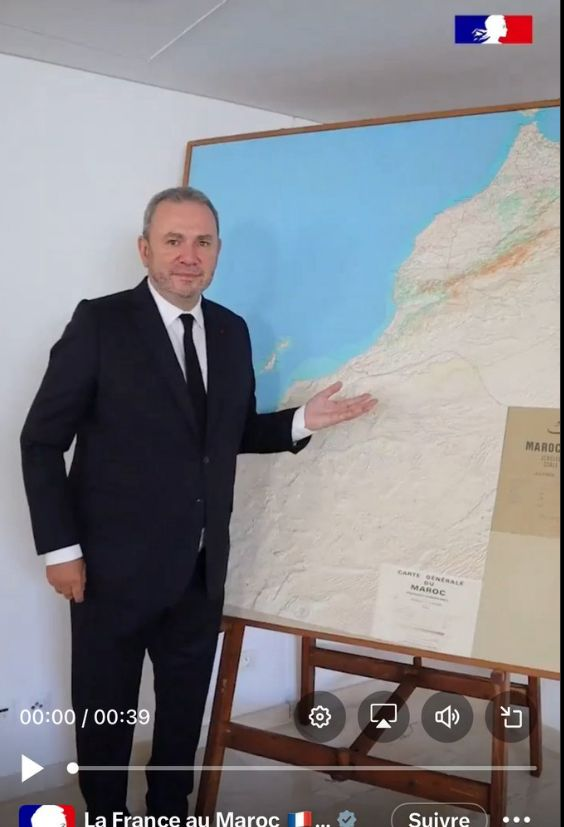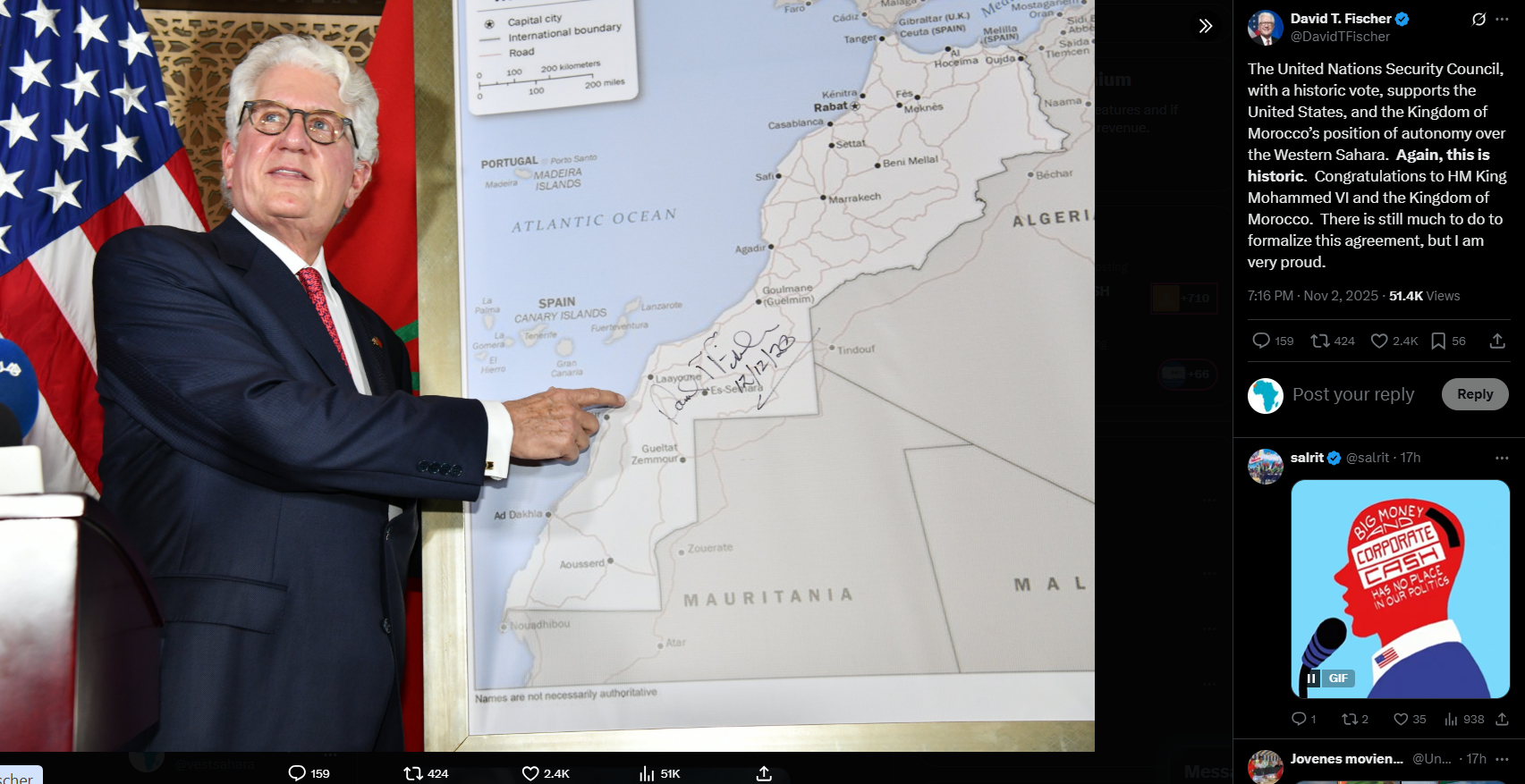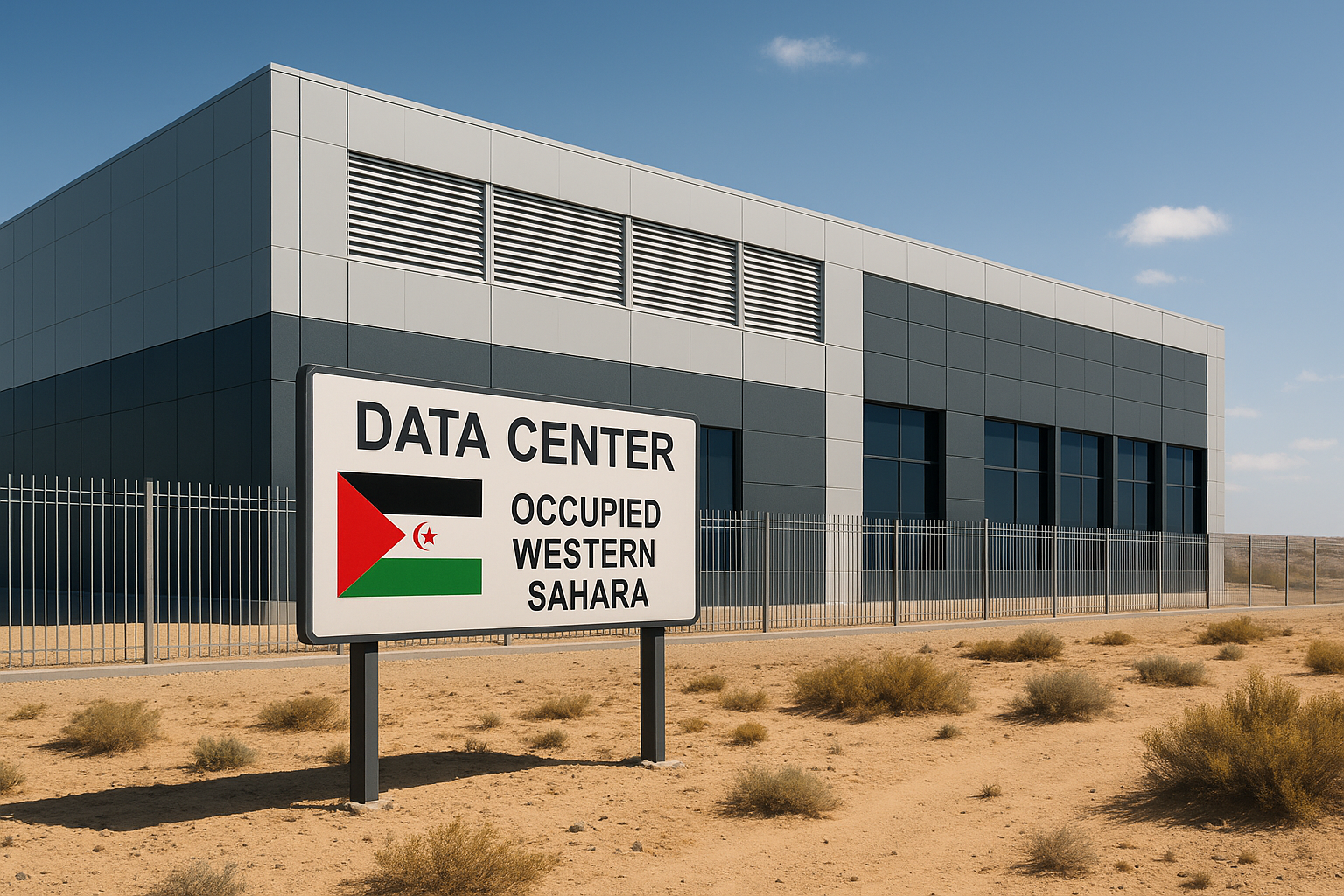
On 31 October 2025, a new resolution was adopted in the UN Security Council calling on the Saharawis to negotiate a solution that would entail their incorporation into the occupying power, Morocco.
Photo: Martine Perre/UN Photos.

France has consistently attempted to undermine international law and human rights in Western Sahara. This has been raised at the political level by Norwegian authorities, including by former Foreign Minister Brende (Conservative Party) in 2015.
Exactly 50 years to the day after the Moroccan military rolled across the borders into Western Sahara, the UN Security Council adopted a new resolution on 31 October that makes it even more impossible to find a solution to the conflict. Two of the Security Council’s members – the United States and France – strongly argue in favour of watering down international law and the UN Charter.
What did the Council adopt?
• The resolution renews the MINURSO mandate for one year (until 31 October 2026). MINURSO is the UN’s operation in the territory.
• The resolution reaffirms previous Security Council decisions and the framework of the UN Charter, aiming to find a “mutually acceptable solution” that ensures self-determination for the people of Western Sahara.
• The Council calls for engagement without preconditions. The Council does not recognize Moroccan sovereignty over the territory.
And here comes the paradox:
• The text highlights Morocco’s so-called “Autonomy Proposal” as the way forward in negotiations. It does this while at the same time stressing the right to self-determination. This contains a fundamental contradiction: Morocco rejects the possibility that the Sahrawis could reject the autonomy proposal. The Sahrawis are given no choice other than incorporation into Morocco, which fundamentally violates self-determination law. It is not the first time the Security Council has referenced the autonomy proposal, but never to this extent in asserting that a solution must occur within the framework of incorporation into Morocco. At the same time, Polisario’s proposal for a solution—previously mentioned in resolutions—is now omitted from the text. Polisario has insisted that any solution must be consistent with previous peace agreements and the UN Charter.

Western Sahara has been classified as a colony since the 1960s. Every other colony has been given the opportunity to decide for itself.
It is worth noting the repeated and likely deliberate grammatical error in the resolution text: A negotiated solution should be “taking as basis Morocco’s Autonomy Proposal.” In correct English, it would have to read “the basis” (the solution) or “a basis” (a possible solution). As written, “taking as basis” is poor English. By failing to clarify whether the proposal is the basis or merely a basis, the Council may have found a formulation that member states could agree on. It may also originate from French phrasing, something like prendre comme base.
From the explanations of vote, it appears that some Security Council member states voted for the resolution primarily to extend MINURSO’s mandate, rather than to support the political aspects of the text.
Russia, China, and Pakistan abstained. Algeria did not participate in the vote. The remaining states, including Denmark, voted in favour.
The entrenched positions
The conflict in Western Sahara is between Morocco, which has invaded the territory, and the Sahrawi liberation movement Polisario. The relationship between the two is asymmetric: by controlling migration flows to Europe in particular, Morocco has succeeded in cultivating close ties with European states. It enjoys extensive political and economic cooperation with Western democracies. Meanwhile, the other party, Polisario, possesses strong legal arguments. International law, the UN Charter, and international courts favour the Sahrawi position. Courts and international law establish that the Sahrawi people themselves must decide the status of their territory.
The two parties’ positions are mutually exclusive. And over the course of the last few years, each is strengthening its own leverage: Morocco scores politically; Polisario scores legally in the courts.
The new Security Council resolution appears to conflict with the UN Charter and decolonization law by prioritizing one option, the Moroccan one, while ignoring Polisario’s proposal, which is based on previously agreed frameworks. The contradiction in Security Council resolutions — simultaneously referencing the autonomy proposal as a realistic solution and insisting that self-determination must apply — has existed since 2007. It is not for other states to instruct the Sahrawi people what they must choose. But the paradox has never been more pronounced than now.
What is the autonomy plan?
It is not clear what the autonomy plan actually entails. The first Moroccan reflections on an “autonomy model” appeared in the early 2000s. After several years of considering the idea, Morocco presented its framework solution in 2007 — the day after Polisario presented its own proposal.
Morocco’s autonomy proposal emerged at a time when it had gained increased influence in the Security Council: France was led by the now corruption-convicted president Nicolas Sarkozy (who was, incidentally, arrested in France after a trip to occupied Western Sahara), and U.S. foreign policy was led by a close friend of the Moroccan royal family: Secretary of State Hillary Clinton.
This French-American alignment has now returned with Trump and Macron in the leading roles. (See Macron’s shocking 2024 speech on Western Sahara.)
From 2007 onward, the Security Council adopted resolutions referencing the autonomy plan. The resolutions always reaffirmed the right to self-determination while describing Morocco’s proposal as “realistic and credible,” without explaining on what basis. How can it be credible or realistic if the people who must decide do not want it?
In subsequent negotiations from 2007, Polisario asked whether it would be possible for the Sahrawis to vote yes or no on the proposal. Morocco reportedly had no answer as to whether the proposal could be rejected. By that point, Polisario had already accepted that Moroccan settlers could vote in a referendum on independence.
In October 2024, the UN Special Envoy for Western Sahara noted that Morocco should "explain and expand" what it means by the autonomy plan.
The lack of clarity regarding what the autonomy plan actually entails was also raised in last week’s explanations of vote from several countries, including the United Kingdom.
The Security Council’s member states have thus abandoned the UN Charter and ignored the right to self-determination in favour of a solution they themselves do not fully understand.
Reactions
Both in the press conference (or download) immediately after the Security Council meeting and in a statement later that evening, Polisario expressed that they remain ready to negotiate a solution to the conflict, but that they are disappointed with the resolution.
“While reaffirming its continued readiness to engage constructively in the UN-sponsored peace process in Western Sahara, the Frente POLISARIO stresses that it will not be party to any political process or negotiations based on any proposals, regardless of their origin, which aim to ‘legitimise’ Morocco’s illegal military occupation of Western Sahara and deprive the Sahrawi people of their inalienable, non-negotiable, and imprescriptible right to self-determination and sovereignty over their homeland,” Polisario writes.
Polisario’s proposal for a solution from 2007 was further elaborated on 21 October 2025 in a letter to the Security Council.
The resolution text that the Americans presented to the Council on 31 October was already heavily watered down from the original draft. In the days leading up to the vote, thousands of Sahrawis took to the streets protesting against Trump’s proposal.
What now?
There are two casualties here.
First, the international legal order.
The Security Council is out of step with the UN Charter, decolonization law, the International Court of Justice, and regional courts such as the EU Court of Justice and the African Court on Human and Peoples’ Rights.
It is paradoxical that states like Denmark and the United Kingdom — which defend the right to self-determination in cases like Greenland and the Falkland Islands — are here effectively saying that self-determination can be ignored in favour of an occupying power’s unilateral proposal to expand its borders through force.
States that have supported Morocco’s autonomy plan in recent years have always done so hand-in-hand with Moroccan authorities, often in connection with investment, migration, or energy agreements. When these states describe the autonomy plan as “realistic” or “preferred”, or “most feasible,” as the Security Council now writes, it is always without having engaged with the Sahrawis. It is considered “realistic” only if one ignores the existence and preferences of the Sahrawi people. These same states do not apply the same logic to other occupations.
The second casualty is the people of Western Sahara and the peace process.
If anything, the situation is now more entrenched than it was a week ago.
In negotiations, the Sahrawis will naturally be unable to trust promises from the Moroccan government. Morocco’s invasion has caused the Sahrawis 50 years of suffering. A significant part of the population has disappeared, and leading activists are serving life sentences. The previously agreed referendum was first sabotaged and later abandoned by Morocco. On top of that, Morocco is not, in reality, a functioning democracy. Can the Sahrawis give up their right to independence in exchange for promises from a government that has violated their rights and broken promises for 50 years?
If Polisario negotiates away self-determination, they will lose their legitimacy among the Sahrawis. The Sahrawis know they have the right to self-determination. A peace solution based on a forced outcome will not be supported by the people itself, and therefore cannot be sustainable.
NY Check new Western Sahara poster!
“Try to Visit Western Sahara”…
Saharawis Demonstrate Against Trump Proposal
The United States has proposed in a meeting of the UN Security Council on Thursday that the occupied Western Sahara be incorporated into Morocco.
Skretting Turkey misled about sustainability
Dutch-Norwegian fish feed giant admits using conflict fishmeal from occupied Western Sahara. Last month, it removed a fake sustainability claim from its website.
Morocco plans massive AI center in occupied Western Sahara
A 500 MW hyperscale data center for Artificial Intelligence is being envisaged in the occupied territory.



